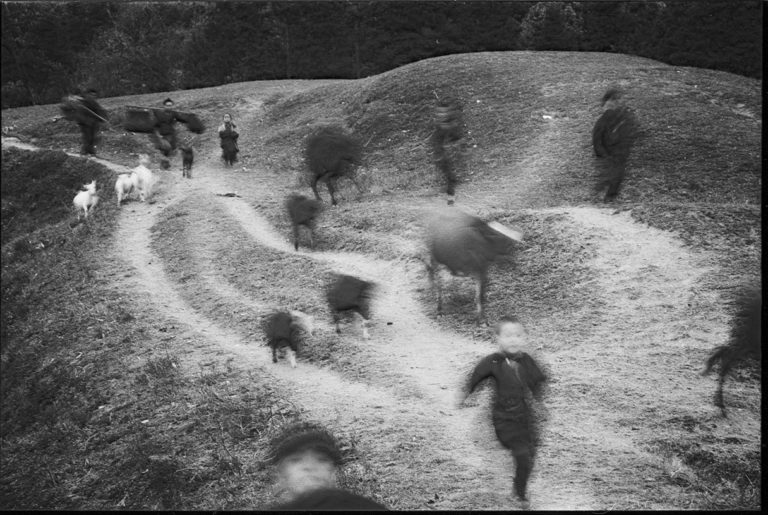
Image by 美撒郭/Flickr, Attribution-ShareAlike.
The Long Life of Trauma in the Time of Twitter
One of the biggest paradoxes of modern life is that, on the one hand, things move faster than they ever have (we Google and tweet and ‘gram) and on the other, we cannot transcend the way that psyches and bodies slowly metabolize experience, especially the traumatic kind. It takes years. Sometimes it takes decades. Often, it takes multiple lifetimes.
I’ve been thinking about this as I’ve been witnessing and sometimes participating in the conversation about race taking place in this country. I first read about the Charleston shooting on Twitter. It trickled into my consciousness in the form of 140-character fragments. I started stitching them together as I clicked on links. I felt a now familiar feeling — the rug pulled out from under me, a sense that whatever I had been preoccupied with just moments before was trivial in comparison to something so grave.
In the next moment, as I am still feeling that sense of familiar displacement, that inert devastation, I start to think about how I can or should respond. At first, in the case of Charleston, I thought that I couldn’t possibly post on Facebook because anything I could think to write wasn’t equal to the weight and tragedy of the event. I didn’t want to trivialize it in my haste. Then I started to see friends of color calling out white people’s silence on the topic and realized that my pause could be read as neglect rather than reverence. The last thing I wanted was to communicate, by not communicating, that this didn’t matter to me. So I posted something raw and pointed, something meant to communicate that I was feeling angry and sad and responsible.

Strangely, this is the emotional labor of the informed 21st century citizen: you learn about cataclysmic events, you react, you communicate a representation of that reaction. Or you don’t, and that may be fine, or it may be misread. It all happens so fast.
And yet the residue of events like these doesn’t wash away in a flood of tweets. Pain has a profoundly long memory. Trauma affects us at a cellular level, makes us sick, gets passed down. The memory of dehumanization mutates, goes underground, and re-emerges in new forms on new days with new names — for both the person who was dehumanized and the person who did the dehumanizing.
I got very interested in the long memory of pain through my own grandmother’s life and death. I only met her a couple of times, but insatiably curious and a sucker for the truth, I spent some of my young 20s researching her life. What I learned was that she had experienced a lot of pain, never spoken, and therefore never metabolized, and that this pain had morphed into mental illness and this mental illness had kept her away from me. But something else that’s very interesting happened: despite being robbed of a relationship with her, I actually followed in her path in many mysterious ways. She wanted to be a writer, but never got to. I, not knowing this about her, became a writer.
It might be a coincidence, sure. Maybe I just come from literary stock and it manifests as a desire to write it all down. Or it might be a dynamic far more complex to trace, but no less real. It might be what psychologist Carl Jung called “genetic memory” — that we each inherit memories, feelings, and ideas from our ancestors via a “collective unconscious.” This means that trauma can travel beyond the limited space of one measly lifetime. This means that unlived dreams, like my grandmother’s, can hop onto the next host and stubbornly beg to be lived out.
It sounds new agey, but then you read things like this, and it turns out that science actually has some explanations for how our cells turn trauma on and off, pass them down as we procreate, keep pain alive for centuries. The relatively obscure field of epigenetics is teaching us all kinds of things about how emotions live in bodies.
Then you start to think about how very recent slavery actually was in this country. Its legal end was 1863, but it continued de facto long after that. You read Dr. Joy DeGruy on post-traumatic slave disorder. And you start to wonder if your own ancestors were slaves or slave owners, and either way, you realize that there is something your body is still metabolizing, no doubt, that is influencing how you respond to Charleston, how your respond to police shootings of unarmed black men, how you respond to the woman sitting across from you on the bus.
Acknowledging this duality is almost more than I can hold. I am the woman, fingers flying across the keyboard, posting a status update on Facebook about the tragedy in Charleston, trying to mobilize other white people to do something in real time and I am a repository for many lifetimes of traumatic experiences that went unspoken, a tomb of unspoken violations that never really die. I have my Twitter handle and my genetic memory. I have my urgency and my legacy. It all exists at once.
I can’t help but wonder if we would be more effective — as citizens, as organizers, as teachers, as parents — if we could spend more of our time tending to the long life of trauma (referenced so beautifully in john a. powell and Krista Tippett’s recent conversation). It’s daunting to investigate your own inheritance — either as the violated or the violator — and yet, it may be the only way we are ever going to dig out the roots of racial trauma in this country. All of us. No exceptions.


